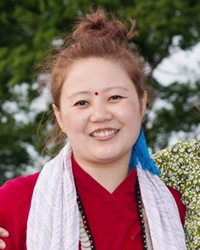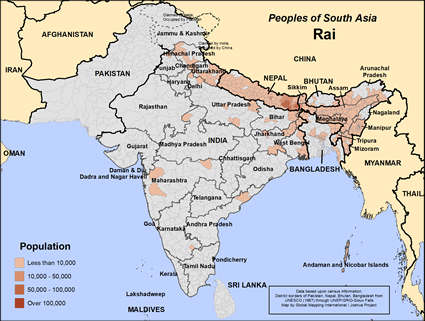Rai in Nepal

Photo Source:
Rai504089 - Wikimedia
Creative Commons
|

Map Source:
People Group data: Omid. Map geography: UNESCO / GMI. Map Design: Joshua Project.
|
| People Name: | Rai |
| Country: | Nepal |
| 10/40 Window: | Yes |
| Population: | 644,000 |
| World Population: | 774,900 |
| Primary Language: | Nepali |
| Primary Religion: | Other / Small |
| Christian Adherents: | 5.56 % |
| Evangelicals: | 0.00 % |
| Scripture: | Complete Bible |
| Ministry Resources: | Yes |
| Jesus Film: | Yes |
| Audio Recordings: | Yes |
| People Cluster: | South Asia - other |
| Affinity Bloc: | South Asian Peoples |
| Progress Level: |
|
Introduction / History
Located on the southern slopes of the Himalayas between India and Tibet, the Chamlinge Rai belong to a cluster of people known as the Rai, the largest ethnic group in eastern Nepal. Each of the Rai groups speaks a different dialect and has its own religious beliefs. Their languages have transformed from the original language to a mixture of local dialects, from which most take their names. There are more than 32 castes and over 28 different dialects in use within their communities.
Although their facial features are clearly Mongoloid, the Rai claim no relation to the Mongolian peoples.
What Are Their Lives Like?
The Rai are primarily rice farmers. Unfortunately, they have been limited by insufficient knowledge of technology, causing a poor yield in crops. They farm rice in the low-lying areas and raise potatoes, maize, wheat, and barley at higher altitudes. The men are responsible for plowing the fields, while the women take care of planting the seeds. Families often unite to help each other at harvest time. Farmers trade any surplus crops they may have for needed items such as kerosene and salt. Others supplement their meager incomes through craftwork and tailoring.
The Rai typically live in stone or wooden houses made with thatched roofs. The houses usually have wooden porches around the outside.
Collectively, the Rai are recognized as courageous, daring, and fearless individuals. In recent history, they have earned global respect for their bravery in the Royal Nepalese Army. Joining the army is often seen as a means to escape economic hardship. It also brings respect and honor, particularly for those who achieve high military ranks.
Among the Rai, weddings are festive occasions. Some marriages are arranged by kongpi, or middlemen, who negotiate the details of the union. Families receive gifts, and if accepted, a marriage date is set. Other marriages may involve the "arranged kidnapping" of the girl one desires. Many believe this method fosters good fortune.
At the wedding, the parents of the bride and groom receive gifts, as well as a long line of family members and village elders. They sacrifice an animal, usually a pig or rooster, and then serve meat and drinks in abundance. One favorite beverage is made from barley and potatoes. Often they spend the whole night singing and celebrating.
What Are Their Beliefs?
The majority of Nepal's population (including the royal family) is Hindu. However, Hinduism and Buddhism exist side by side and are somewhat intermingled.
While the majority of Rai are Hindus, there are also a large number of animists (who believe that non-human objects have spirits). They are also heavily influenced by Buddhism. For this reason they have a large assortment of deities they serve. These customs are most evident during such events as births, marriages and deaths. The influence of Hinduism has led to many of the dead now being cremated instead of being buried. They believe they are descendants of the goddesses Marema, Mahadeva and Nina (daughter of the earth).
What Are Their Needs?
Nepal has long been hidden away and forgotten by much of the world. The government of Nepal is opposed to any form of proselytizing, and so there are government restrictions, but most of the time, Christians can follow their religion. There are usually more problems from family members than from the government. A handful of Christian missionaries live in Nepal.
Prayer Points
Pray that the Lord of the harvest will call dedicated, long-term laborers to live and work among the Rai people in Nepal and India.
Ask the Holy Spirit to complete the work begun in the hearts of the few Rai believers through adequate discipleship and the encouragement of other believers.
Ass God to show himself through the love and compassion of current believers to raise interest and curiosity among non-believers.